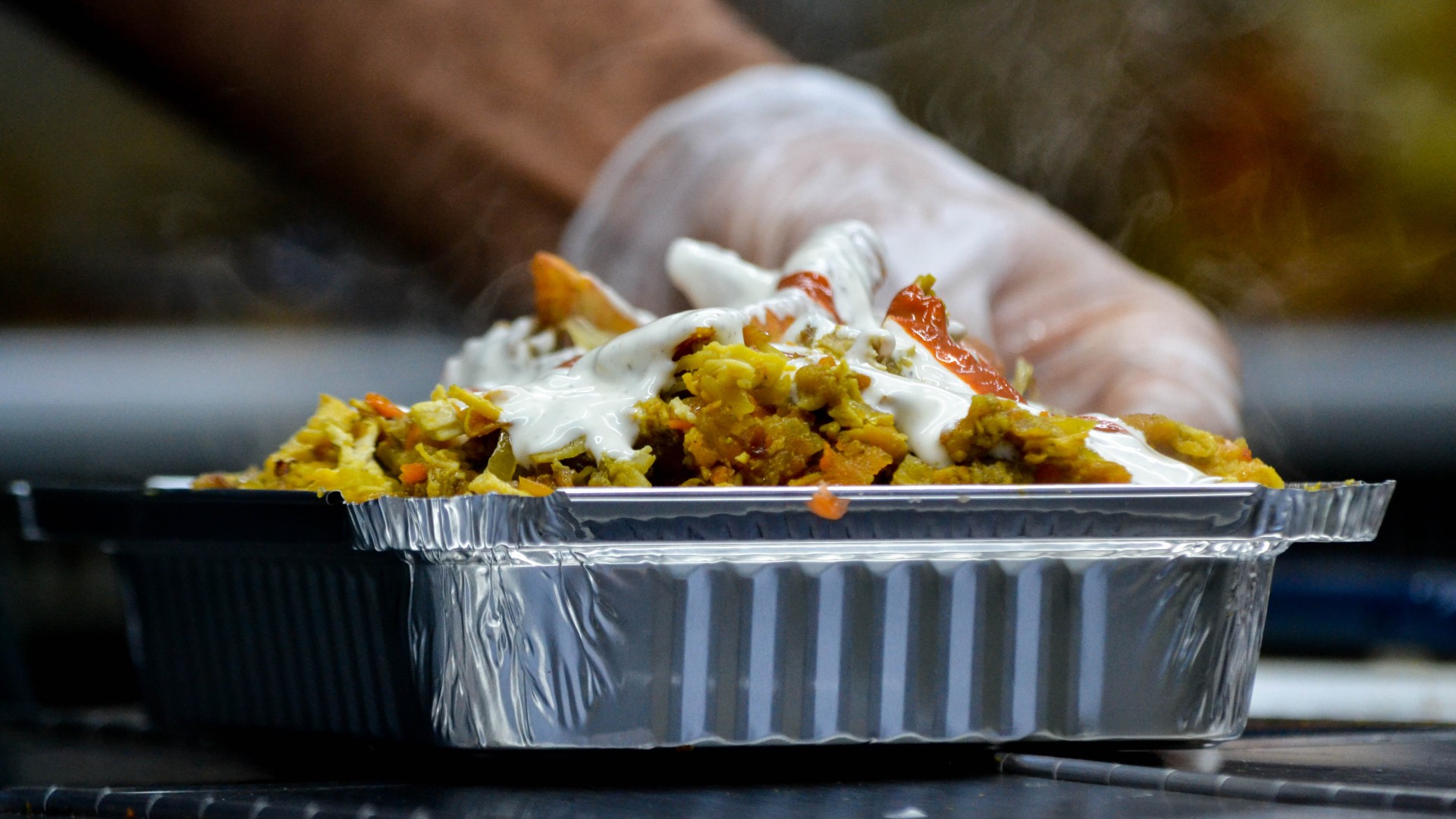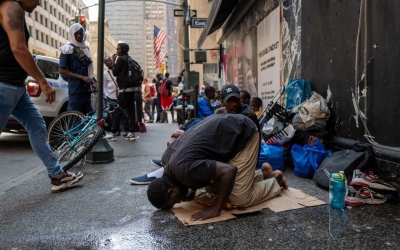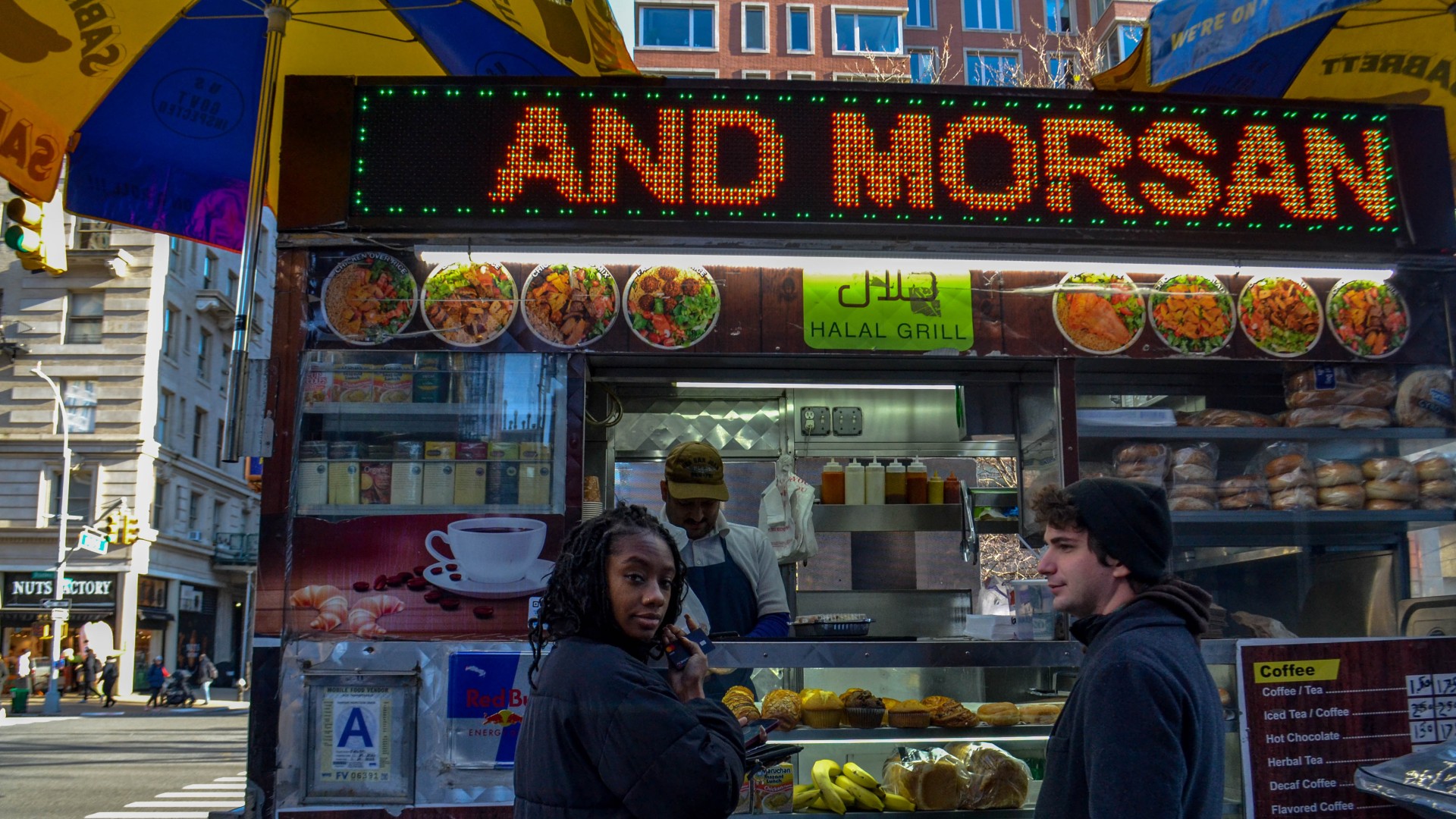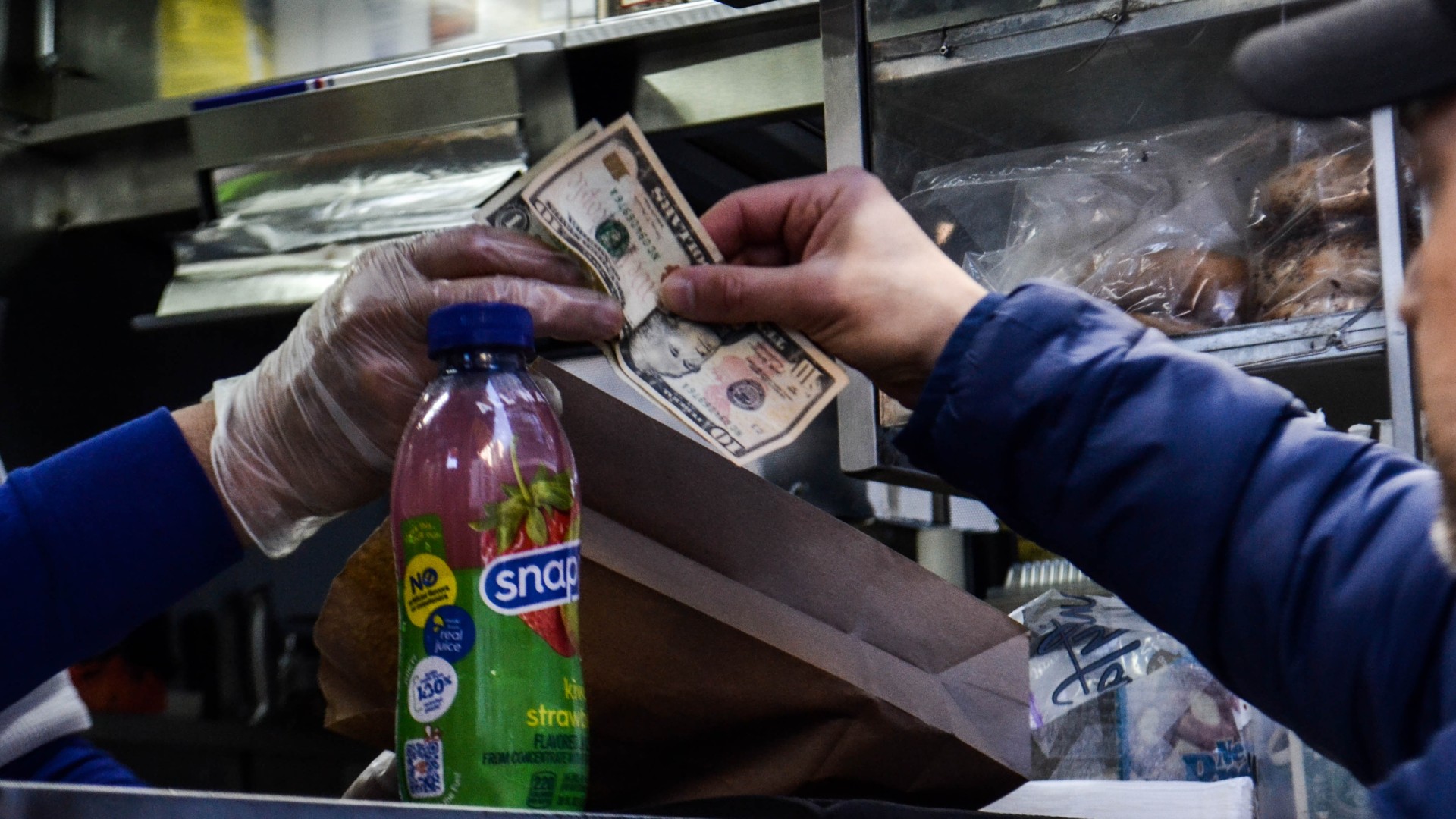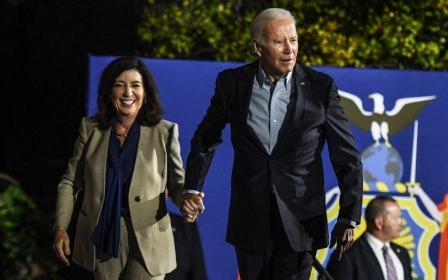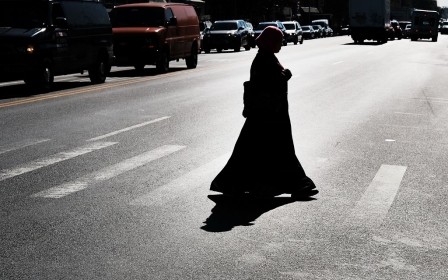New York City's Halal food vendors brush off hate and forge forward
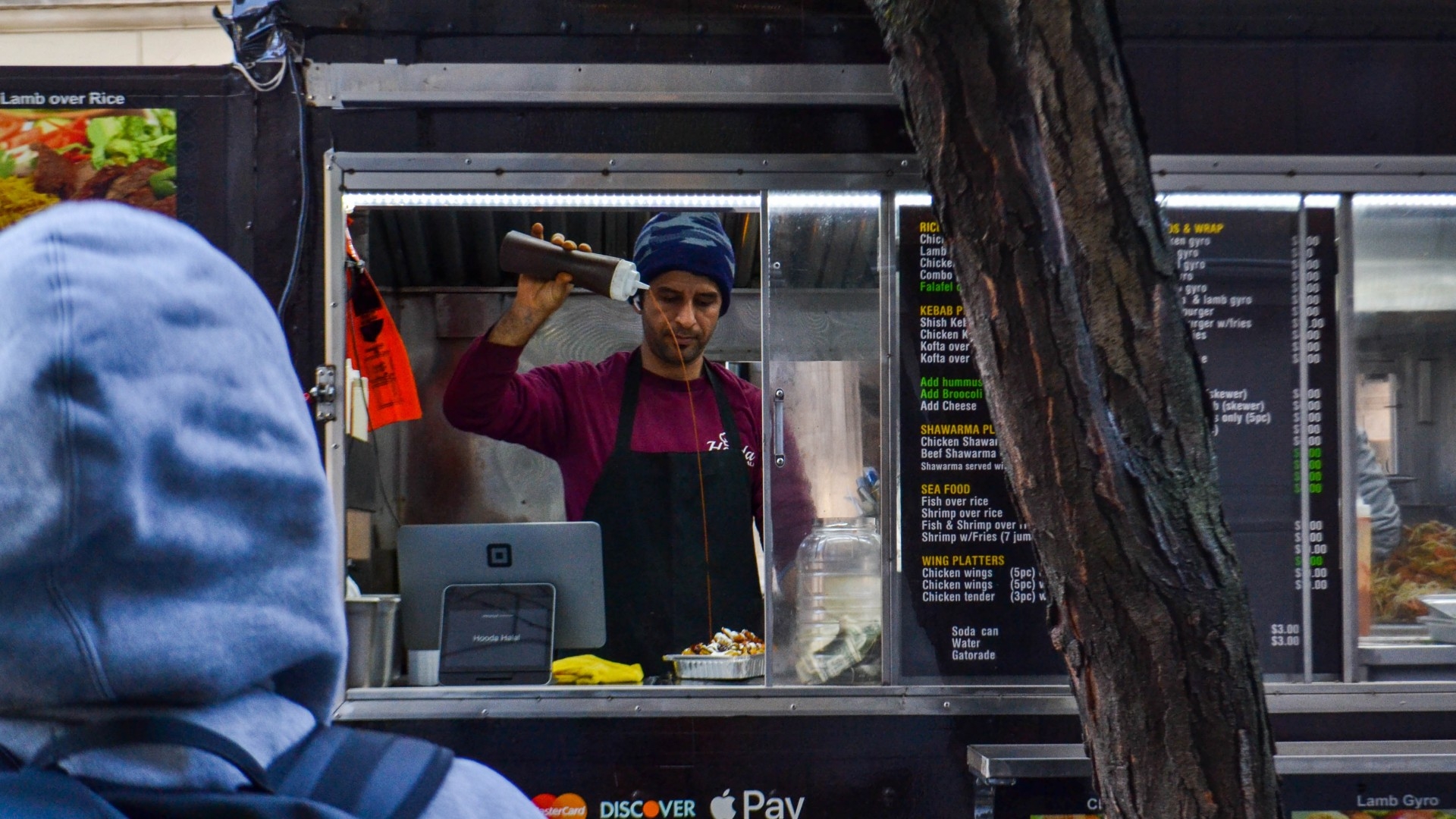
The lunch rush is manic. Five-minute bursts of hungry patrons, followed by a sudden bout of silence, and then the reappearance of a queue - or cluster - of hungry customers donning suits, hard hats or uniforms.
The food carts have names like “King Tut”, “Mashallah”, and “No Pork on my Fork” - pithy names packing as many puns and as much wordplay as possible. And they are permanent odes to the legacies of Arab culture and Middle Eastern cuisine permeating American city life.
Over the past couple of decades, these food stands, simply and aptly known as halal carts, have transformed into icons of New York’s cityscape. They dot street corners, serving up plates of chicken shawarma to burgers or bagels, and drawing in patrons with their fast, hot and filling meals.
But since the 7 October Hamas-led attacks and Israel's war in Gaza, they have made headlines for different reasons. In November, an individual harassed a man working in a food cart near Zabar’s, a famous deli on the Upper West Side, for allegedly removing posters of Israeli hostages. And Stuart Seldowitz, a former advisor to President Barack Obama, was arrested for harassing and stalking a food vendor on the Upper East Side.
These are rare incidents that have prompted an outpouring of support from the community and shaken some workers.
New MEE newsletter: Jerusalem Dispatch
Sign up to get the latest insights and analysis on Israel-Palestine, alongside Turkey Unpacked and other MEE newsletters
“What are you going to do? It’s like any place,” Tarek, a vendor on Manhattan’s Upper West Side who did not give his last name, told MEE. “Some clients are good, some are bad. This is business.”
Recently, he said, some of the “bad clients” have been making more targeted attacks when he is at the food cart.
“They come by and say fuck you… fuck you, Arab, fuck you, Muslim,” Tarek, who emigrated from Cairo years ago, said. “If someone wants to come and swear at me, what am I going to do, curse him back? I can swear, too. But I’m not here to do that. I’m here to work.”
Mohamed Attia, managing director of the Street Vendor Project, or SVP, says that while these incidents are alarming, vendors typically don’t report them, making them virtually impossible to track.
“[Vendors] only assume that talking about a problem will just create more problems for them and that we'll put them in the spotlight that might be followed by a crackdown by enforcement agencies or by a landlord or someone around the area who just want to kick them out of the neighbourhood just because they don't like them."
Know your rights
Attia himself emmigrated from Egypt to New York in 2009, working store jobs to get by until he met a halal cart vendor at his local mosque and eventually wound up working for him before opening his own smoothie stands and halal food carts.
He and his team at SVP worked on the case of the vendor who was harassed by the former Obama official - a response Attia said entailed sharing the video of the harassment, filing a police report with one of the owners of the cart and bringing the incident to the attention of local city council member, Julie Menin.
He said that even then, vendors were anxious about speaking to the media, only taking interviews a good eight hours after the video began circulating.
Menin, who chairs the New York City Council’s small business committee, was not available for an interview. But a member of her staff told Middle East Eye in an email that “our Office reaches out to the NYPD to investigate any time these types of situations arise.
"They are on a case-by-case basis but the Council Member has called out on numerous occasions acts of Antisemitism, Islamophobia, and hate speech as we do not tolerate that and want to make sure our community feels safe.”
The lack of incident reports from vendors is a problem that extends beyond media anxiety into the legal frameworks in which street vendors are situated.
From challenges in obtaining food vendor permits to siting laws - rules that determine where a vendor can and cannot station - regulations around food vendors in New York are so complex and nuanced that they’re virtually “impossible” to follow for vendors unfamiliar with the intricacies of a legal system, Attia said.
To combat this, he says, vendors need to know their rights and report incidents to authorities and to advocates such as SVP.
“I think that vendors who started to be aware of their rights started to fight back and they have been a lot more comfortable to speak out about these issues and share without the fear of retaliation,” Attia said.
But the case of the former Barack Obama-era official is instructive in why vendors might feel resigned. On Thursday, Seldowitz, the former Obama advisor, walked away with a deal that would drop the charges against him if he takes an anti-bias counselling programme.
The deal was condemned by Muslim rights groups, who said the announcement was a “slap in the face” to the victims.
Embedded
The origins of the halal carts that now dot New York City are debated, but they are without doubt now embedded in the city’s affinity for quick, easily accessible, delicious food. Attia said he’s heard about three different origin stories, among them perhaps the most commonly cited: The Halal Guys; thought to be the first halal cart that got its start in 1992 on 53rd and 6th Avenue in Midtown Manhattan, and has now become a franchise with brick-and-mortar locations around the city.
But at the heart of the rise in these carts’ popularity was the need for halal food for one of New York’s fast-growing immigrant communities in the late 1980s or early 1990s.
“The trigger was the Muslim community who are all over the city - the cab drivers who are looking for halal food, while the halal food options were pretty limited across the city,” he said. “They wanted something that is beyond a hotdog or a pretzel, and that's how the chicken over rice was born.”
Street vending became a popular business choice among Egyptian immigrants throughout the last couple of decades. Aside from providing an alternative to jobs in corner shops that require employees to sell alcohol or lottery tickets, which conflict with ideals of the Muslim faith, the food cart business draws migrants in through community access and exposure, Attia said.
“A group of migrants come together and look around what their communities are doing and what opportunities will be out there for them,” he said. “I think it lends itself to the fact that people will think, 'I’ll just do what my cousin or my best friend is doing.'"
Now, Attia said, decades into New York's rich culture of street vendors and halal food carts, it’s time for the city to offer overdue support for the workers who keep this market alive.
Through its Street Vendor Reform Platform, SVP has pitched a bill to the city council that would increase access to licences and permits, repeal criminal liability attached to some aspects of street vending, create outreach, education and resource programmes for vendors, and revisit siting rules.
“We’re making sure that we are getting a fair and just system,” Attia said. “If this bill passes the way it is right now, with everything that we have included and highlighted, we can certainly say that we’ll have a fair system on the books.”
From behind his food cart's window, Tarek continues single-handedly to feed patrons on their lunch breaks on a block of the Upper West Side.
“Everyone, from their own point of view, believes they’re right. Everyone will defend their cause. That’s fine - as long as you don’t hate me, I won’t hate you.”
Middle East Eye delivers independent and unrivalled coverage and analysis of the Middle East, North Africa and beyond. To learn more about republishing this content and the associated fees, please fill out this form. More about MEE can be found here.


